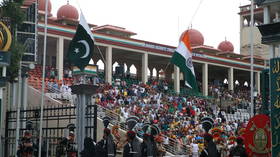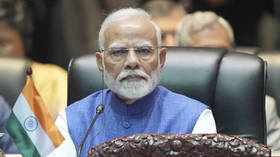SCO should be firm in countering ‘three evils’ – New Delhi
The Indian foreign minister stressed the need for peace and security as he addressed a summit in Pakistan
The goal of the Shanghai Cooperation Organization (SCO) to promote “mutual trust, friendship, and good neighborliness” in Eurasia is more crucial than ever as the world faces major conflicts and security challenges, Indian Foreign Minister Subrahmanyam Jaishankar stressed at a meeting of the grouping in Pakistan on Wednesday.
According to Jaishankar, “genuine partnerships” and “honest conversation” rather than “unilateral agendas” are vital to moving cooperation forward within the SCO. The prominent Eurasian security grouping was established in 2001 by Russia, China, Kazakhstan, Kyrgyzstan, Tajikistan, and Uzbekistan. India and Pakistan became members in 2017, while Iran joined in 2023.
“Our endeavors will progress only when our commitment to the [SCO] charter remains firm. It is axiomatic that development and growth requires peace and stability. And as the charter spelt out, this means being firm and uncompromising in countering the ‘three evils’,” Jaishankar said, referring to terrorism, extremism and separatism.
“If trust is lacking or cooperation inadequate, if friendship has fallen short and good neighborliness is missing somewhere, there are surely reasons to introspect and causes to address,” he added.
The diplomat’s comments came amid friction between India and neighboring China and Pakistan – both of which are SCO members.
Jaishankar’s trip to Islamabad for the SCO summit marks the first visit of an Indian foreign minister to Pakistan in nine years. India has repeatedly accused its neighbor of sponsoring terrorism. During his speech at the UN General Assembly in New York last month, India’s top diplomat asserted that Pakistan’s “cross-border terrorism policy will never succeed” and that New Delhi would react to any hostile actions by Islamabad.
The two nuclear-powered neighbors share a difficult relationship which has largely been frozen since 2019, when Islamabad downgraded its ties with New Delhi following the decision by Narendra Modi’s government to strip special status from the Muslim-majority Jammu and Kashmir region.
Before embarking on his visit to Islamabad, Jaishankar clarified that bilateral talks would not be held during the trip. “I am not going there to discuss India-Pakistan relations,” the diplomat said.
However, Anwaar-ul-Haq Kakar, the caretaker prime minister of Pakistan between August 2023 and March 2024, suggested in an interview with the Indian Express newspaper on Tuesday that “sooner or later” India and Pakistan “will talk.” He stressed that the two nations should “communicate” to resolve their differences.
Jaishankar’s remarks in Islamabad, however, also appeared to be aimed at China. The two Asian powerhouses share a “difficult history” and their ties are currently “significantly disturbed,” Jaishankar stated in a recent speech. Relations soured in 2020 when Indian and Chinese troops clashed in the disputed Galwan Valley, resulting in casualties on both sides. Since then, there have been over a dozen rounds of talks aimed at disengagement along the 3,500km (around 2,100-mile) Line of Actual Control (LAC), the poorly defined frontier between the two countries. In September, New Delhi officials admitted progress had been achieved with Beijing on “disengagement,” but noted that more issues needed to be resolved.
You can share this story on social media:









Comments are closed.